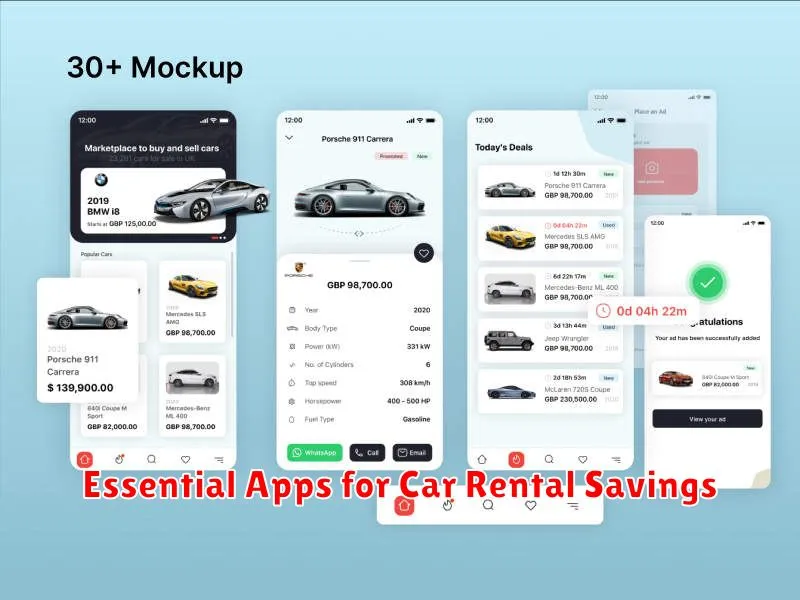Planning a trip and need a car? Renting a vehicle can be expensive, but it doesn’t have to break the bank! This guide on how to maximize savings when renting a car for travel will equip you with money-saving tips and tricks to ensure your rental car costs stay within your budget. Learn how to score the best deals, avoid hidden fees, and ultimately save money on your next car rental. Let’s get started and make your travel dreams a reality without overspending!
Booking Your Rental Car at the Best Times

Planning a trip and need a rental car? Securing the best deal depends heavily on when you book. Knowing the optimal times to book can save you significant money and hassle.
Generally, the sweet spot for booking your rental car is 2-4 weeks in advance. Booking too early risks missing out on potential lower prices, as rates can fluctuate. Booking too late, however, increases your chances of facing limited availability and potentially higher prices, especially during peak travel seasons.
Consider these factors:
- Time of year: Peak seasons (summer holidays, major events) will have higher demand and prices, requiring earlier booking. Off-season travel typically offers more flexibility and lower rates.
- Day of the week: Weekday bookings are often cheaper than weekend bookings due to lower demand.
- Specific travel dates: Flexibility in your travel dates can significantly impact pricing. If possible, consider shifting your travel dates by a day or two to potentially find better deals.
- Location: Popular tourist destinations will generally have higher rental car costs and less availability. Booking well in advance is crucial in these areas.
Pro-tip: Use price comparison websites to scout for the best deals. Many sites allow you to filter by dates, location, and car type, making it easier to find the perfect fit for your needs and budget. Don’t be afraid to experiment with different dates and times to find the lowest price.
Remember, securing the best rental car deal is about planning and flexibility. By considering these factors and booking at the optimal time, you can save money and focus on enjoying your trip.
How to Use Coupons and Discounts for Car Rentals
Renting a car can be a significant expense, especially during peak travel seasons. However, savvy travelers know that using coupons and discounts can dramatically reduce the overall cost. This guide will walk you through various strategies to snag the best deals on your next car rental.
1. Website Coupon Codes and Deals:
Many car rental companies, such as Hertz, Avis, Enterprise, and Alamo, offer promotional codes on their websites. These codes are frequently updated, so it’s crucial to check their sites before booking. Look for sections labeled “Specials,” “Deals,” or “Promotions.” Signing up for their email newsletters can also provide you with exclusive offers and early access to sales.
2. Third-Party Booking Websites:
Websites like Expedia, Priceline, and Kayak often have partnerships with car rental agencies and offer exclusive discounts. These platforms frequently aggregate deals from multiple providers, allowing you to compare prices and potentially find hidden savings. Remember to compare prices across different sites before booking to ensure you’re getting the best deal.
3. AAA and Other Membership Discounts:
If you’re a member of AAA (American Automobile Association) or similar organizations, you may be eligible for member discounts on car rentals. Check your membership benefits to see if they offer any partnerships with rental agencies. Similarly, some credit card companies offer rewards programs that provide discounts or cash back on car rentals.
4. Military and Senior Citizen Discounts:
Many car rental companies offer special rates for military personnel and senior citizens. Remember to bring your military ID or senior citizen identification to claim these discounts at the rental counter. These savings can be substantial, so always inquire about these possibilities.
5. Negotiating at the Counter (Less Common Now):
While less common due to online booking prevalence, sometimes negotiating at the rental counter can still yield unexpected savings. Politely inquire about any available discounts or promotions not advertised online. Be prepared to point out lower prices found on competitor websites. However, success with this method is dependent on the rental agent’s discretion and availability.
6. Travel Agent Assistance:
Consider contacting a travel agent. They often have access to exclusive deals and package offers that bundle car rentals with flights and hotels, providing substantial savings. Their expertise in finding the best deals can be invaluable.
By employing these strategies, you can significantly reduce the cost of your next car rental and enjoy more of your travel budget for other activities! Remember to always read the fine print and understand the terms and conditions before making your reservation.
Choosing the Right Car Model for Your Needs
Buying a car is a significant investment, and choosing the right model is crucial for ensuring you get the most out of your purchase. With so many makes and models available, the process can feel overwhelming. This guide will help you navigate the options and find the perfect car to match your lifestyle and budget.
1. Define Your Needs and Budget
Before you even start browsing dealerships or websites, take some time to honestly assess your needs. Consider your daily commute, the number of passengers you regularly transport, and your cargo needs. Do you frequently haul large items? Do you need excellent fuel economy? Determining these factors will significantly narrow down your options. Equally important is establishing a realistic budget, including not just the purchase price, but also insurance, fuel, maintenance, and potential loan payments.
2. Consider the Type of Vehicle
The type of vehicle you need will depend heavily on your lifestyle and priorities. Sedans offer a balance of comfort, fuel efficiency, and affordability. SUVs provide more space and often come with all-wheel drive, making them suitable for families and those living in areas with challenging weather conditions. Trucks are ideal for those who need heavy-duty hauling capabilities. Minivans maximize passenger space and are practical for large families. Hybrids and electric vehicles are excellent choices for environmentally conscious buyers seeking better fuel economy.
3. Research and Compare Models
Once you have a clearer idea of your needs and budget, you can start researching specific models. Use online resources like Kelley Blue Book (KBB), Edmunds, and Consumer Reports to compare different vehicles based on reliability, safety ratings, performance, and features. Pay attention to reviews from other owners to gain valuable insights.
4. Test Drive Several Models
Don’t make a final decision without test driving several models that meet your criteria. Pay attention to the car’s handling, comfort, and features. See how it feels to drive in different conditions and make sure it fits your driving style. This step is crucial in determining if a car is truly the right fit.
5. Negotiate the Price
Once you’ve chosen your preferred model, it’s time to negotiate the price. Be prepared to walk away if you don’t feel the deal is fair. Remember to factor in all costs, including taxes, fees, and financing. Don’t rush the process – take your time and make sure you are comfortable with the terms.
6. Secure Financing
If you’re financing your purchase, shop around for the best interest rates. Compare offers from different lenders, including banks, credit unions, and dealerships. Understanding the terms of your loan is crucial to avoid unexpected costs.
Choosing the right car is a personal decision. By following these steps and taking your time, you can find a vehicle that meets your specific needs and provides years of reliable transportation.
The Pros and Cons of Prepaid Car Rentals
Considering a prepaid car rental for your next trip? It might seem like a great way to lock in a price and avoid surprises, but like any travel decision, it has its advantages and disadvantages. Let’s weigh them up to help you make the best choice for your circumstances.
Pros of Prepaid Car Rentals:
One of the biggest benefits of prepaying for your rental car is the price certainty. You know exactly how much you’ll be paying upfront, eliminating the risk of fluctuating rates or hidden fees. This is particularly beneficial for budget travelers who want to stick to a fixed budget. Another advantage is the convenience. Booking and paying in advance often means a smoother pick-up process at the rental counter – less paperwork and quicker access to your vehicle. Finally, prepaying can sometimes secure you a better deal, especially if you book well in advance and take advantage of early bird discounts.
Cons of Prepaid Car Rentals:
Despite the advantages, prepaying for a rental car also presents some potential drawbacks. The most significant is lack of flexibility. If your travel plans change, canceling or modifying a prepaid booking can be difficult and may incur substantial cancellation fees. Additionally, you’re locked into a specific vehicle type. If you need to change your vehicle choice upon arrival (e.g., due to unexpected needs or availability), you might find yourself stuck with your original selection or facing extra charges. Furthermore, some prepaid rentals might have restrictive terms and conditions that could limit your options or lead to unforeseen expenses.
Weighing the Pros and Cons:
Ultimately, the decision of whether or not to prepay for a rental car depends on your individual needs and travel style. If budgeting and convenience are your top priorities and you’re confident in your travel plans, then prepaying could be a good option. However, if flexibility and adaptability are more important, then opting for a pay-at-the-counter rental might be a better choice. Carefully consider your priorities and compare offers from different rental companies before making a decision. Reading the fine print is crucial to avoid unexpected surprises and charges.
Remember to always compare prices and terms and conditions from various car rental providers before making your final decision.
How to Avoid Fuel Charges by Refueling Yourself

Many car rental companies tack on significant fuel charges, often leaving renters feeling unfairly burdened with unexpected costs. These charges can significantly inflate your final bill, turning a seemingly affordable rental into a pricey experience. Fortunately, there’s a simple way to avoid these added expenses: refuel the vehicle yourself before returning it.
Understanding the Fuel Policy: Before picking up your rental car, carefully review the rental agreement’s fuel policy. Most companies offer several options, including:
- Pre-paid fuel: You pay for a full tank upfront, often at a higher-than-market rate. This is generally the most expensive option and rarely the best value.
- Refuel yourself: You are responsible for returning the vehicle with the same amount of fuel as when you received it. This is the most cost-effective approach.
- Return with empty tank (often with a fee): This option allows you to return the car with an empty tank, but the company will charge a substantial fee to fill it.
Choosing the Right Option: The best way to avoid extra charges is to select the “refuel yourself” option. This gives you complete control over the cost of fuel. You can fill up at a gas station of your choice, ensuring you get the best price possible.
Tips for Successful Self-Refueling:
- Take a photo of the fuel gauge: Before driving away, take a picture of the fuel gauge to document the starting fuel level. This serves as evidence in case of any disputes.
- Fill up close to the return time: Don’t wait until the last minute to refuel. Traffic or unexpected delays could prevent you from filling up before the return.
- Use a reputable gas station: Stick to well-known gas stations to avoid any potential issues with fuel quality.
- Keep your receipt: Keep your fuel receipt as proof of purchase. This can be helpful if the rental company disputes your fuel level.
By understanding the rental agreement and opting to refuel the vehicle yourself, you can easily save money and avoid unexpected fuel charges. It’s a simple yet effective strategy for keeping your rental car costs under control.
Understanding Mileage Limits on Rental Cars
Renting a car can be a convenient and affordable way to get around, but it’s crucial to understand the terms and conditions, especially concerning mileage limits. Many rental companies impose daily or total mileage allowances on their vehicles. Exceeding these limits can lead to significant extra charges, potentially spoiling your trip.
How to identify mileage limits: Before you finalize your rental agreement, carefully review the contract. The mileage allowance is usually clearly stated, often expressed as a daily limit (e.g., 100 miles per day) or a total limit for the entire rental period (e.g., 1000 miles for a week). Pay close attention to whether the limit is daily or total, as this significantly impacts your planning.
Understanding the costs of exceeding mileage limits: If you surpass your allocated miles, expect to pay a surcharge. This cost varies widely depending on the rental company, the car type, and the location. Some companies charge a flat fee per extra mile, while others may have tiered pricing, with the cost per mile increasing as you exceed the limit further. This additional cost can quickly mount up, especially on long road trips.
Tips for managing mileage: To avoid unexpected charges, plan your itinerary carefully and try to stay within the allotted miles. Use online mapping tools to estimate distances and consider alternative routes to minimize driving. If you anticipate exceeding the limit, contact the rental company in advance to discuss options like purchasing an additional mileage package. This is often cheaper than paying the per-mile surcharge after you’ve exceeded the limit.
Unlimited mileage options: Many rental companies offer unlimited mileage packages for an added fee. While this might seem expensive upfront, it can provide peace of mind, especially if you plan extensive travel. Weigh the cost of unlimited mileage against the potential cost of exceeding a standard mileage limit – sometimes, the unlimited option is the more economical choice.
In summary: Understanding and managing mileage limits is vital for a stress-free rental car experience. By carefully reviewing your contract, planning your route, and considering your mileage needs, you can avoid unpleasant surprises and enjoy your trip without worrying about unexpected fees. Don’t hesitate to ask the rental company any questions you might have about their mileage policies; clarifying things upfront is always best.
Car Rentals for Group Travel: Best Practices
Planning a group trip? Securing reliable transportation is crucial for a smooth and enjoyable experience. Car rentals can be a cost-effective and convenient solution, but navigating the process for a large group requires careful planning and attention to detail. This guide outlines best practices to ensure your group travel goes off without a hitch.
Choosing the Right Vehicles: The first step is determining your transportation needs. Consider the size of your group, the amount of luggage you’ll have, and the type of terrain you’ll be traversing. Will minivans suffice, or will you need larger vehicles like SUVs or even a van rental? Making an accurate assessment will prevent last-minute scrambling and potential inconvenience.
Booking in Advance: This cannot be stressed enough. Booking your rental vehicles well in advance, especially during peak travel seasons, is essential to secure availability and potentially secure better rates. Don’t leave it to the last minute; the longer you wait, the more limited your options may become, and prices may increase significantly.
Comparing Rental Companies and Rates: Don’t settle for the first quote you see. Compare prices and policies across multiple rental companies. Look beyond the base price and consider additional fees like insurance, mileage charges, and potential surcharges for drivers under a certain age or for additional drivers. Websites that compare rental car prices can be invaluable in this process.
Understanding Insurance and Liability: Thoroughly review the insurance options offered by the rental company. Decide whether your existing insurance covers rental vehicles, and consider purchasing supplemental insurance if necessary to protect yourself from potential financial liabilities in case of accidents or damage.
Driver Requirements and Additional Drivers: Confirm the driver requirements, including age restrictions and licensing stipulations. If multiple people will be driving, ensure you add all additional drivers to the rental agreement to avoid any issues or penalties. Many rental agencies charge an additional fee per driver.
Pre-Trip Vehicle Inspection: Upon picking up your vehicle(s), perform a thorough inspection. Note any existing damage, scratches, or dents, and document them with photos or video evidence. Report any pre-existing damage to the rental company representative immediately to avoid being held responsible later.
Fuel Policy: Pay close attention to the fuel policy. Some companies require you to return the vehicle with a full tank, while others may offer a pre-paid fuel option. Understanding the policy will help you avoid unexpected charges.
Communication is Key: For a large group, clear communication is critical. Designate a point person responsible for coordinating the rental process, managing communication with the rental company, and addressing any issues that may arise.
By following these best practices, you can significantly improve the efficiency and enjoyment of your group travel experience. Remember, careful planning and preparation will lead to a smoother, less stressful journey for everyone involved.
When to Choose Airport vs. City Rentals
Choosing between renting a car from the airport or a city location can significantly impact your travel experience. The best option depends on several factors, including your travel style, budget, and specific needs. Let’s break down the pros and cons of each to help you make the right decision.
Airport Rentals: The Convenience Factor
Airport rental agencies offer undeniable convenience. You can pick up your car immediately after landing, avoiding the hassle of navigating public transport with luggage. This is particularly beneficial for travelers arriving late at night or those with limited mobility. The process is often streamlined, and everything is conveniently located within the airport complex.
However, airport rentals often come with a higher price tag. Airport locations typically charge higher rental fees and added fees due to their prime location and higher operating costs. You’ll also likely face longer wait times, especially during peak travel seasons, due to higher demand.
City Rentals: Saving Money and Exploring
Renting from a city location offers the potential for significant cost savings. Rental rates are generally lower outside of airport zones, and you might find better deals by comparing offers from different agencies. Plus, choosing a city location gives you the opportunity to explore a different part of town and potentially discover hidden gems.
The trade-off, however, is the added travel time and effort involved in getting to the rental location. You’ll need to arrange transportation from the airport, which could mean taking a taxi, bus, or train, adding time and expense to your journey. This can be especially inconvenient with heavy luggage. Additionally, city locations may have a more limited selection of vehicles compared to airport locations.
Making the Right Choice: A Summary
Ultimately, the best option depends on your priorities. If convenience and speed are paramount, an airport rental is the better choice. However, if saving money is your top priority, then a city rental is worth considering. Weigh the pros and cons carefully, factoring in your travel schedule, budget, and comfort level with public transportation, to ensure you make the most suitable choice for your travel needs.
Consider these questions:
- What’s my budget?
- How much luggage do I have?
- What time will I arrive/depart?
- Am I comfortable using public transportation?
Comparing Rental Companies for the Best Deals
Finding the best deal on a rental car can feel like navigating a minefield. Prices fluctuate wildly depending on the time of year, location, vehicle type, and even the day of the week. To avoid overpaying, it’s crucial to compare multiple rental companies before you book.
Start your search early. Booking in advance, especially during peak season, often secures the best rates. Websites like Kayak, Expedia, and Priceline offer comparison tools that allow you to see prices from various rental companies side-by-side. This saves you the time of visiting each website individually.
Consider the total cost. Don’t just focus on the advertised daily rate. Pay close attention to additional fees such as airport surcharges, insurance options (often overpriced), and potential extra charges for fuel policies. Some companies offer “all-inclusive” packages that might be more cost-effective in the long run.
Read the fine print carefully. Before confirming your booking, thoroughly review the rental agreement. Understand the terms and conditions regarding mileage limits, permitted drivers, cancellation policies, and any restrictions on where you can drive the vehicle. Hidden fees can quickly add up and become a nasty surprise.
Check reviews. Websites like TripAdvisor and Yelp can offer valuable insights into the experiences of other renters. Look for feedback on the quality of service, vehicle condition, and ease of the pick-up and drop-off process. Negative reviews might highlight potential problems you should be aware of.
Be flexible with your dates and pick-up/drop-off locations. If possible, try adjusting your travel dates by a day or two, or considering a slightly different pick-up or drop-off location. Even small changes can sometimes result in significant savings.
Don’t be afraid to negotiate. While less common online, if you’re booking directly with a rental company, don’t hesitate to inquire about potential discounts or better rates. Sometimes, a little polite negotiation can go a long way.
By following these tips, you can increase your chances of securing the best possible deal on your next rental car. Happy travels!
Essential Apps for Car Rental Savings

Planning a trip and need a rental car? Forget endless scrolling through websites! These essential apps can help you snag the best deals and make your car rental experience smoother.
1. Kayak: Kayak isn’t just for flights! This popular travel site also offers comprehensive car rental searches, comparing prices from numerous providers. Its intuitive interface and flexible search filters (like car type, location, and insurance options) make finding the perfect rental a breeze. You can even set price alerts so you’re notified of any drops.
2. Expedia: Similar to Kayak, Expedia provides a one-stop shop for travel needs, including car rentals. They frequently offer bundles that combine flights, hotels, and rental cars for significant savings. Look for exclusive member discounts or promotional codes to maximize your savings potential.
3. Priceline: Known for its “Name Your Own Price” feature for hotels, Priceline also offers competitive car rental rates. While you might not always know the exact car you’ll get, their Express Deals can often lead to substantial discounts. It’s a great option if you’re flexible and prioritize price above specific car models.
4. AutoSlash: This app takes the guesswork out of finding the best deal. Simply enter your rental details, and AutoSlash will monitor prices and automatically rebook your reservation if a cheaper option becomes available. It’s a set-it-and-forget-it solution for those seeking maximum savings with minimal effort.
5. Rentalcars.com: This dedicated car rental app offers a vast selection of vehicles from various suppliers worldwide. Their customer reviews can help you choose reliable rental companies and avoid potential issues. The app provides real-time updates on your reservation and offers convenient features like managing add-ons and contacting customer support.
Bonus Tip: Before booking, always compare prices across multiple apps. Rental car prices can fluctuate, so taking a few minutes to check several sources can save you a significant amount of money. Remember to read the fine print carefully and understand the terms and conditions, including insurance policies and cancellation fees.
By using these apps strategically, you can transform your car rental experience from a stressful expense into a smart and affordable part of your travel plans. Happy travels!

